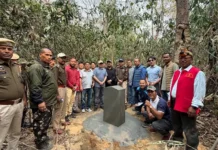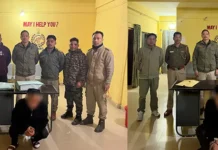[ Habung Lampung ]
Are we doing justice to our responsibilities? There is always scope for self-improvement.
When we speak of retrospection and rededication, we are essentially reflecting on the profound significance of these two concepts in the life of an APCS officer – or any civil servant. Before we delve into the idea of rededication, it is important to first engage in retrospection and introspection. These reflections form the foundation upon which we must re-examine the evolving dynamics of administration and renew our commitment. We must be aware of how the APCS cadre has evolved since the union territory days in terms of our roles, responsibilities, powers and the rising aspirations that people associate with these positions. Understanding this evolution is vital.
It is equally important to acknowledge and appreciate the earlier generations of civil servants, whose simplicity and dedication continue to inspire. Many of them were so committed to their duties that they became role models for those aspiring to join the civil services. Unfortunately, in recent times, the actions of a few have cast a shadow over the reputation of the civil services.
Over the decades, the expectations of the public from the government and its civil servants have changed drastically. People are more curious and vigilant about our work. Take, for instance, in the mid-1980s when I came to Itanagar, there was just one private school, Donyi Polo Vidya Bhawan. Most of us were natural products of government schools. Today, private institutions are present in nearly every sector. This signifies that citizens now have choices and alternatives, which in turn places higher expectations on the quality of services provided by the government.
Moreover, people are more informed about their rights and global developments. Those among us who still hold a traditional mindset must understand that the landscape of governance has shifted.
We must embrace a more citizen-centric approach in our dealings. Our conduct before the public greatly influences their trust in us. Listening to public grievances, even when the solution is beyond our jurisdiction, helps in building trust Receiving criticism with humility strengthens that bond and often makes our jobs easier, as people become more cooperative and appreciative. We should always be available in the office, unless on some field duties, etc. This is one way to prove our sincerity.
Another aspect, which may not be palatable to everyone, is the rise in personal expectations from the job. When desires exceed official entitlements, inefficiency and corruption creep in. We must regulate our lifestyle and align it with what is ethically and officially due to us. Social dynamics in Arunachal Pradesh have also changed. There is a growing tendency to view others’ actions with suspicion and from narrow perspectives. This is a growing challenge and demands conscious efforts to foster inclusivity and mutual respect.
Another crucial area needing reflection is workplace management. Earlier, the command-and-control model was simpler, with more discipline and obedience. Today, managing a diverse workforce, including MTS, requires strong team spirit and inclusive leadership. A key challenge is the hierarchical attitude of some seniors, who inhibit the free flow of ideas by asserting superiority. Such behaviour hampers team cohesion. Leadership must appreciate every member, regardless of rank, to create a sense of value and belonging.
Time constraints limit the discussion, but these points represent core concerns. With this reflection, we now move towards rededication.
Rededication is essentially a renewed internal pledge to perform our duties with sincerity and without personal gain. Here are a few points to consider if we are truly serious about rededicating ourselves:
Let us rededicate ourselves to fewer expectations, less attachment to position, and more humility in words and deeds. Often, dissatisfaction stems from unmet personal expectations and that, in turn, affects performance.
We must shift our mindset, especially regarding the role of political executives, to avoid friction. Recognising their constitutional role and understanding the fundamental rights of citizens is crucial. To remain practical and results-oriented, I personally keep a daily diary, using two different ink colours, to distinguish and track key tasks and timelines. Human memory is short, and this practice ensures accountability and focus.
As the saying goes, Rome was not built in a day. We must also uphold collective responsibility, continuing the good work initiated by seniors, juniors, or colleagues. Often, commendable initiatives are abandoned when a new officer takes over – a symptom of missing continuity in vision.
Continuous learning is another vital aspect. As APCS officers, we are often posted with multifarious task and need to engage with the last man in the queue, which makes it all the more important to keep updating ourselves and learning from the world around us.
These are some of my personal reflections on retrospection and rededication, and have nothing to do with official assignments. They are meant to reaffirm our shared duty: to live up to the aspirations of the people of Arunachal through prompt and efficient service delivery. As human beings, we will make honest mistakes, but what matters is whether we continue to introspect and ask ourselves: Are we doing justice to our responsibilities?
There is always scope for self-improvement. (The contributor is Joint Secretary to Govt of Arunachal Pradesh)


